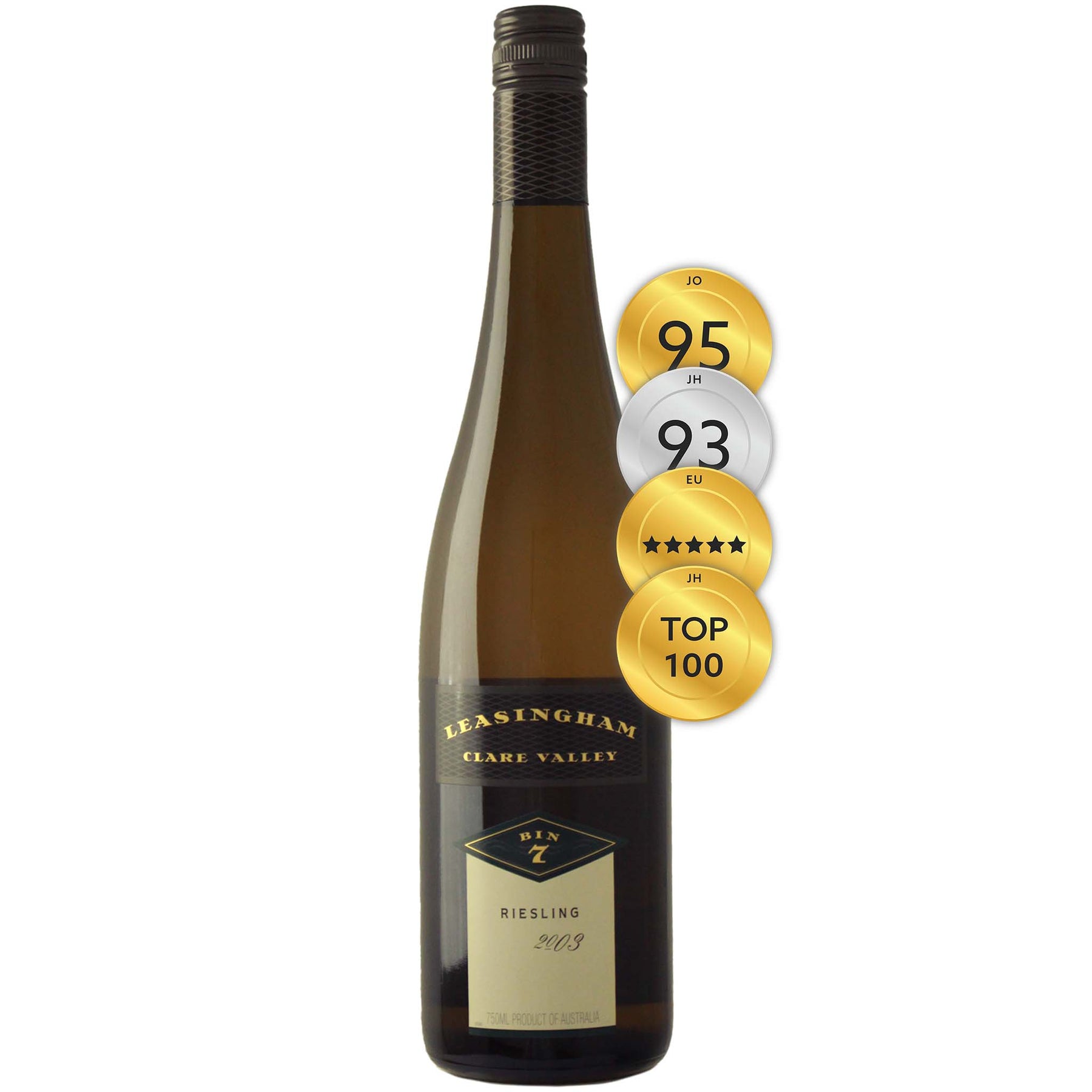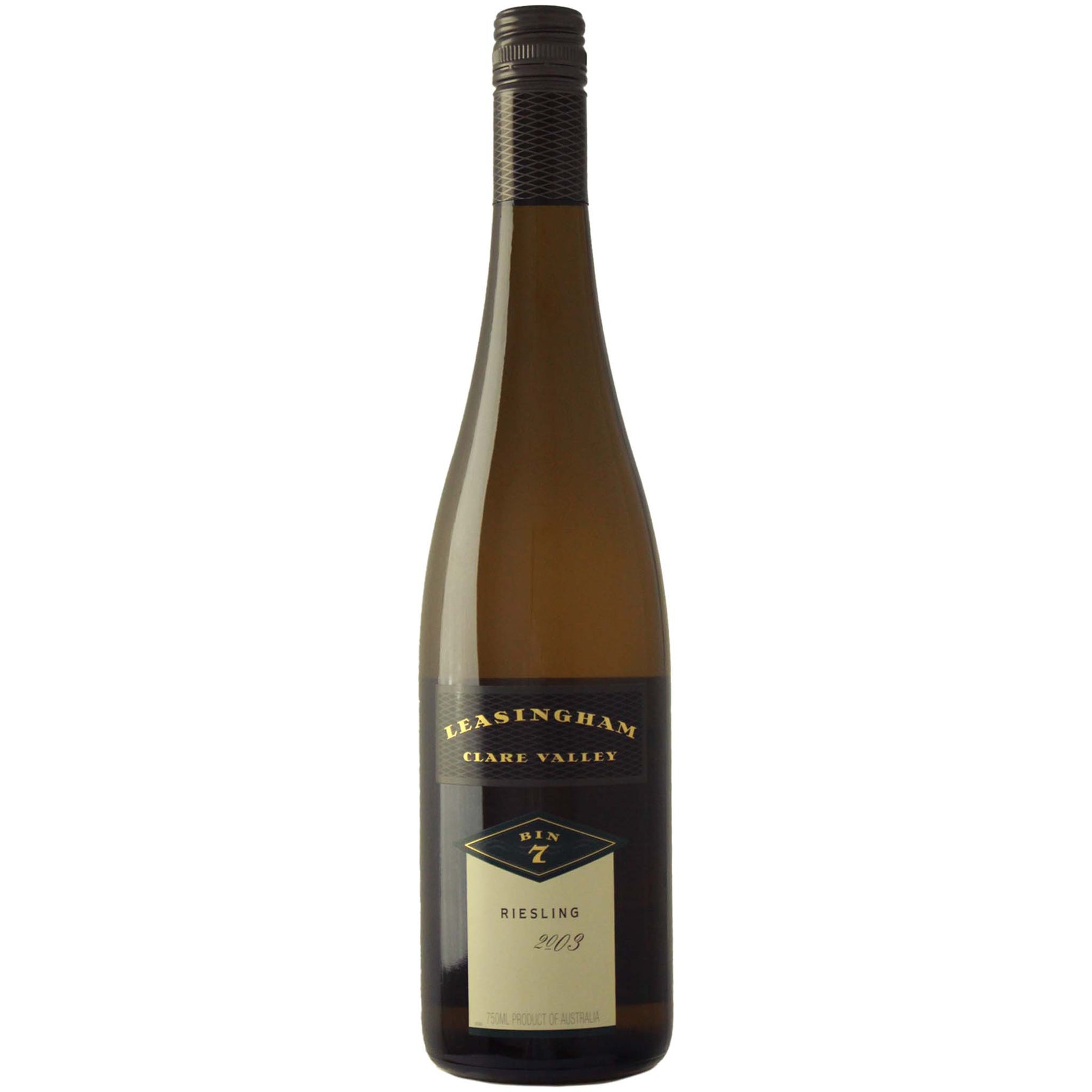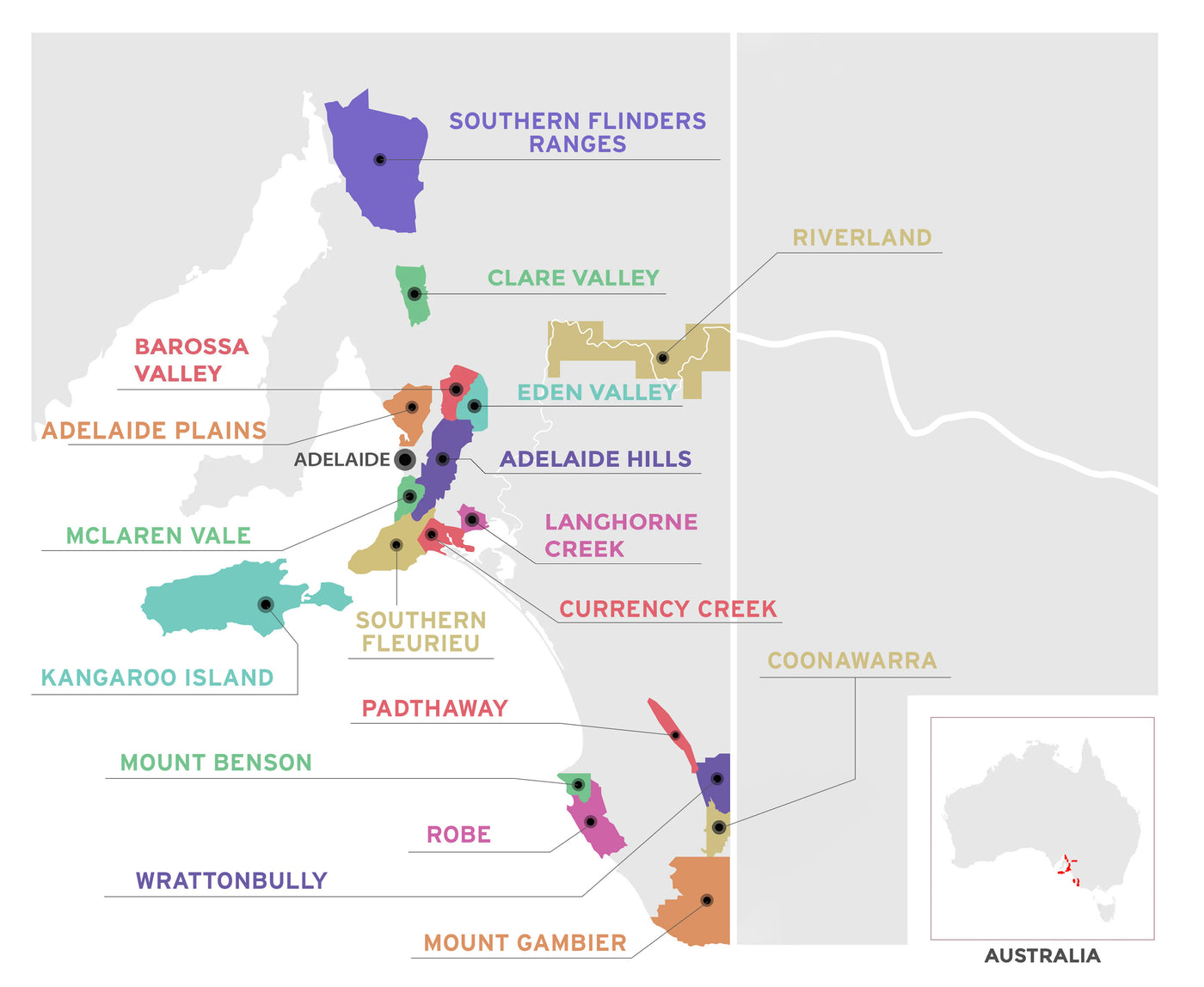

Leasingham Bin 7 Riesling 2003
Style: White Wine
Variety: Riesling
Closure: Screwcap
Leasingham Bin 7 Riesling 2003
Warehouse
34 Redland Drive
Vermont VIC 3133
Australia
Producer: Leasingham
Country: Australia
Region: Clare Valley
Vintage: 2003
Critic Score: 95 and ★★★★★
Alcohol: 12.5%
Size: 750 ml
Drink by: Now
Halliday Top 100 Wines of 2003
In 1969, Leasingham released its first vintage of Bin 7 Riesling. It soon established a reputation for quality and consistency, winning Gold medals at countless wine shows. Tim Knappstein was the architect of that success. Bin 7 is vinified from parcels of Riesling grown from distinctly different sites, including distinguished vineyards around Watervale and Neagles Rock. "Right from the outset, the more austere and elegant style of Bin 7 manifested itself, due in no small part to the very different pattern of picking. It is a formula which has worked wonderfully well over the years," writes James Halliday.
"Seems to be a permanent part of the Top 100, but you can't ignore it: old vines and lots of winemaking experience are a potent combination. A clean and precisely chiselled bouquet leads into a palate with considerable intensity and length, lime/citrus with a flinty underlay. Generous but not heavy." James Halliday
Expert reviews
"This vibrant and refreshing riesling has a musky fragrance of rose petals, white peaches and pear, lime juice and lemon, plus an appealing spiciness. Bursting with concentrated citrus and tropical riesling flavour, it's long, racy and austere, with a chalky texture culminating in a refreshing slate-like finish. Drink 2008-2011." Jeremy Oliver - 95 points
"Seems to be a permanent part of the Top 100, but you can't ignore it: old vines and lots of winemaking experience are a potent combination. A clean and precisely chiselled bouquet leads into a palate with considerable intensity and length, lime/citrus with a flinty underlay. Generous but not heavy. Drink Now to 2013." James Halliday, Halliday Wine Companion - 93 points and Top 100 Wines for 2003
"Consistently one of the best value Clare rieslings around. Gorgeously classic Clare nose of sweet lime, Juicy Fruit chewing gum and sherbet. Upfront and full in the mouth. Loaded with juicy sweet fruit and wonderfully integrated acidity. Powerful, long and persistent. Drinking beautifully now and a bargain considering the quality." Divine Food & Wine Magazine
"This Clare Valley classic is astonishing value, especially as it is often discounted well below the usual prices. It is a pale, greenish wine with delicate floral aromas, lime and peach-like fruit characters. The palate is middling in intensity at the moment and needs time to build, but it's all there, wrapped up in tingly acidity to keep it zippy." Epicure Uncorked ★★★★★
Awards
Halliday Top 100 Wines of 2003
About Bin 7

In 1858, the 18-year-old Joseph Herman Knappstein arrived in the Clare from Germany. In late 1984 he established the Stanley Wine Company with three other shareholders. By 1912, Joseph, an astute and entrepreneurial businessman, owned the company outright. He died in 1919 intestate and the company went into management until the family took over again in 1938.
Three years before regaining control of the company, a decision was made by the family that was to be their salvation. They embarked on a planting program with cuttings taken from an old patch of vines in disrepair, vines that had always produced the best wine. By 1937, 14 acres had been planted. The vines were Riesling and over the years, leading with refrigeration, and closed and controlled fermentation, the Company pioneered the grape variety for which the Clare is now famous.
Mr Mick (Karl Knappstein, Joseph’s 11th child) took over the company in 1962. His passion as a vine grower led to further propagation of premium Riesling in the 1960s and by 1971, Leasingham had established over 240 hectares of vineyards in the Watervale area, riesling dominating the plantings.
In 1967, Tim Knappstein was appointed winemaker. In 1969, Leasingham released its first vintage of Bin 7 Riesling. It soon established a reputation for quality and consistency, winning Gold medals at countless wine shows. Tim was the architect of that success. He describes the wines as being startling by the standards of their time, but not by those of today.
Bin 7 is vinified from parcels of Riesling grown from distinctly different sites, including distinguished vineyards around Watervale and Neagles Rock. Two neighbouring vineyards are located in the town of Watervale, others are located at the eastern ridge of Clare. These parcels have historically been the foundation of the Bin 7 style, selected for their fineness, generosity of flavour and vibrant mineral backbone.
"Right from the outset, the more austere and elegant style of Bin 7 manifested itself, due in no small part to the very different pattern of picking. Bin 7 has always been a blend of early-picked grapes, high in natural acid, and with as little as 10 degrees of alcohol, combined with mid-season grapes, and a lesser quantity of fully ripe material. It is a formula which has worked wonderfully well over the years," writes James Halliday.
About the winery

Leasingham, established at the end of 1894, was originally known as the Stanley Wine Company, later on as Stanley Leasingham and today as Leasingham. The company so dominated the Clare Valley in the early days that in many ways the history of the company is that of the Clare Valley.
The founding shareholders of the Stanley Wine Company were Joseph Knappstein, one of the largest vineyard owners in the district; John Cristison, a local brewer of note; Dr Otto Wein-Smith, the district medical practitioner; and Magnus Badger, a local solicitor. The name Stanley was chosen to identify the company with the local electoral district of Stanley.
The first vintage, in 1895, was 18,000 litres. Production grew in leaps and bounds over the ensuing years and by 1901 had reached 360,000 litres per year. Due to a crisis in the export side of the business in 1902, Joseph Knappstein, who had subsequently set up a very successful ships chandlers business in Fremantle, returned to Clare to take charge of the Stanley Wine Company.
By 1912, Joseph had bought out the interests of the other three founders and gained control of the company. In 1919, Joseph died intestate, and control of the business was vested in Elders Trustees. Following a long and bitter period of mismanagement, the Elders returned the company to the Knappstein family in 1938, in return for a release from any claims against it by the family.
In 1954, the Company purchased another 200 acres of land at Leasingham and the planting program continued apace. Producing a superior product, Stanley wines were very much in demand from other wineries that were slower to introduce progressive planting and winemaking technology. From 1954 to the mid-1960s a significant proportion of the wine Stanley produced was sold to Lindemans which underpinned the growth of the company. Penfolds, Seppelt, Hardy's, Orlando, and McWilliams also purchased large quantities of wine.
Mick Knappstein, Joseph’s 11th child, took over the company in 1962. His passion as a vine grower led to further propagation of premium Riesling in the 1960s and by 1971, Leasingham had established over 240 hectares of vineyards in the Watervale area, riesling dominating the plantings. In 1967, Tim Knappstein was appointed winemaker. In 1969, Leasingham released its first vintage of Bin 7 Riesling.
In 1971 the H.J. Heinz Corporation purchased the company. The Knappstein family retained key positions in the company - Tim Knappstein was kept on as winemaker and Mick was retained as managing director - and held shares until 1976. In 1984 the Heinz company purchased the Buronga winery in Mildura, New South Wales. The production of Stanley wine casks was transferred from the Clare Valley winery to Buronga, which is closer to the supply of fruit for cask wines. The Leasingham operation was then free to concentrate on the production of premium wines.
The Leasingham wineworks was acquired by The Hardy Wine Company in January 1988, when a major upgrade of vineyards, winery, tourism and promotional facilities was begun. The name Leasingham was reserved for premium wines only - the Stanley name continued on a range of wine casks produced at the Buronga winery.
In 2008, Hardy's changed its name to Constellation Wines Australia, and a year later closed the winery and sold three of its key estate vineyards. Then in 2010, Constellation offered its winemaking equipment and winery-cellar door facility for sale. Constellation retained the Leasingham brand, and Tim Adams purchased the winery and most of the winemaking equipment.
"This left the Leasingham brand without any physical anchor. On the face of it, it would seem unlikely that the quality of the hitherto excellent wines can be maintained," according to James Halliday.

South Australia
South Australian is responsible for more than half the production of all Australian wine. It is home to more than 900 wineries across 18 wine regions. The regions are Adelaide Hills, Adelaide Plains, Barossa Valley, Clare Valley, Coonawarra, Currency Creek, Eden Valley, Kangaroo Island, Langhorne Creek, McLaren Vale, Mount Benson, Mount Gambier, Padthaway, Riverland, Robe, Southern Fleurieu, Southern Flinders Ranges and Wrattonbully.
Many of the well-known names in the South Australian wine industry established their first vineyards in the late 1830s and early 1840s. The first vines in McLaren Vale were planted at Reynella in 1839 and Penfold's established Magill Estate on the outskirts of Adelaide in 1844.
South Australia has a vast diversity in geography and climate which allows the State to be able to produce a range of grape varieties - from cool climate Riesling in the Clare and Eden Vallies to the big, full bodied Shiraz wines of the Barossa Valley and McLaren Vale. Two of Australia's best-known wines, Penfolds Grange and Henschke Hill of Grace, are produced here. There is much to discover in South Australia for the wine lover.

